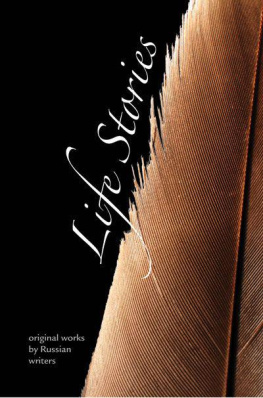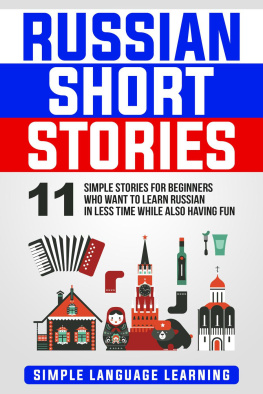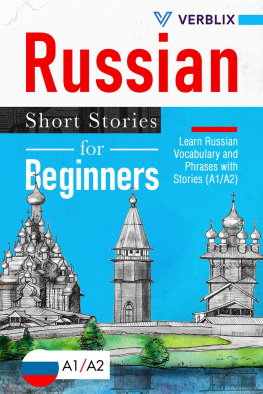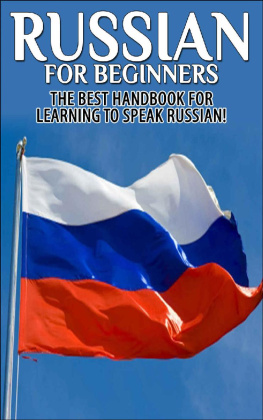Life Stories
original works by Russian writers** The writers and translators in this volume have donated their creative output to this collective work, so that all proceeds from its sale might go to benefit Russian hospice care.
Copyright 2009 for this collected work by Russian Information Services, Inc. All rights reserved.
Copyright to the individual works in this volume is governed by U.S. and international copyright laws. Works may not be reproduced in any manner without the expressed, written permission of the copyright holders. For permission to reproduce selections from this book, contact the publisher at the address below.
Cover image Alleng (dreamstime.com).
ISBN 978-1-880100-58-5
Published by Russian Information Services, Inc.
PO Box 567
Montpelier, VT 05601-0567
www.russianlife.com
orders@russianlife.com
phone 802-223-4955
fax 802-223-6105
It's time, my friend, it's time! my heart begs for peace
Days fly past, and each hour carries off
Another fragment of our life, but together we
Make our plans for life, and loin our time we die.
In the world there is no happiness, but there is peace and free will.
Long have I dreamed of that enviable fate
Long have I, a weary slave, schemed to flee
To a distant abode of labor and pure delight.
Alexander Pushkin
Contents
, by Lyudmila Ulitskaya
, by Andrei Gelasimov
, by Boris Grebenshchikov
, by Yevgeny Grishkovets
, by Alexander Kabakov
, by Alexander Khurgin
, by Eduard Limonov
, by Dmitry Lipskerov
, by Sergei Lukyanenko
, by Vladimir Makanin
, by Marina Moskvina
, by Viktor Pelevin
, by Ludmila Petrushevskaya
, by Zahar Prilepin
, by Dina Rubina
, by Dunya Smirnova
, by Vladimir Sorokin
, by Vladimir Voinovich
, by Viktor Yerofeyev
, by Leonid Yuzefovich
Instead of an Introduction
Lyudmila Ulitskaya
Dear Friends!
Today, you and I have no plans to die. Quite the opposite: we make our plans for the years ahead, and much of what we plan comes to pass. We value our energy and our time, enjoy the luxury of good health, take pleasure in being with loved ones, and occasionally even have the privilege to travel, taking in the nature and culture of other lands.
To enjoy life, to be grateful for its gifts is part of being human. But there are thingsdifficult, distressing, unbearable things like illness, suffering or deaththat poison our joy of living. Yet even in this there is something good: it means that our souls are alive and can respond to the suffering of the others; the power of this response reveals to us our true place in the universe. As long as we are capable of empathy, we are morally alive.
The natural progression of human lifefrom youth, strength, beauty and health to decay, illness, suffering and death, which none of us can escapeoccurs in a social environment that can either aggravate our suffering or alleviate it. In this dimension, it is not the laws of nature that are at work, but the laws, rules and stereotypes created by our society. And Russian society today presents a dismal picture. Our state, which once assumed responsibility for the social wellbeing of its people, is failing to meet its obligations. Yet we as a community have other reservesboth material and spiritual.
Despite our society's deep inertia and pessimism, more and more of our people are willing to address great social ills. A few years ago, I was introduced to Vera Millionschikova's efforts to organize and manage the First Moscow Hospice, and this became a turning point for me: I realized that, even in our complex conditions, one could do this difficult work in a way that creates meaning and beauty, extracting dignity from the chaos that surrounds us. This is not only about helping people who are suffering and dyingthis is about building a better society, about fostering people's respect for themselves. Vera Millionschikova's cause, the hospice center she created, gives us the opportunity to change our lives, to affect our world, to become more human.
Contributing to the work of the Vera Hospice Charitable Fund gives us an opportunity to nurture a noble and necessary cause, to subtract from the great sum of human suffering in our not-altogether-well state. It is also a conscious move to take responsibility for a sphere in which our government appears to invest little meaning or value. Yet, in fact, it is here, in the last hospital bed, that the miracle of human life, that greatest of values, is fully and ultimately present.
Translation by
Note for Introduction
- 1. Author and member of the Board of Trustees of the Vera Hospice Charity Fund.
About Hospice Care
Hospice care is a free institution of social medicine that is completely new to Russia. Hospice care gives terminal cancer patients and their families not only relief from pain, but also other medical, social, psychological, spiritual and legal assistance; services are provided not only for the duration of the illness, but also in the aftermath of the loss of a loved one. Hospice accepts patients that other hospitals have rejected as "hopeless."
In the fifteen years of its activity, First Moscow Hospice, under the unwavering leadership of Vera Vasilievna Millionschikova, has earned an impeccable reputation and has helped thousands of people. When hospice workers care for the dying and educate their families about the basics of such care, they lift the immeasurable burden of guilt plaguing those who do not have time, confidence or knowledge to help a loved one when recovery is no longer possible.
In hospice care, more than in any other medical establishment, the staff work intimately with death, pain and the family's tears, 365 days a year, 24 hours a day.
Hospice cares for the dying, most of them elderly. But the more important thing is that the patients are still alive. What they need is not a speedy death but a dignified life. Like all living beings, they need love and care. There are many such patients; in Moscow alone 23,000 people succumb to cancer every year. And even though Moscow already has eight hospice care centers, the need for hospice care is far from being met. Hospice care is necessary for the handicapped, for coma patients, for those paralyzed as a result of a stroke, for AIDs patients and for disabled children.
Hospice does not abandon such patients. They are still alive, and this means that doctors must help them live for as long as life is given to them. Hospice is not the house of death; it is a home for hope and faith in human strength.
Contact information:
First Moscow Hospice
10 Dovatora Street, Moscow
Phone: 8-499-245-59-69, fax: 8-499-245-4322
E-mail: info@hospice.ru, website www.hospice.ru
Hospice Commandments
1. Hospice is comfortable conditions and decent life to the very end.
2. We work with living people. The only difference between us and our patients is that they are most likely to pass away before us.
3. We should not hurry death, nor artificially prolong life. Everyone lives one's own life. Nobody knows how long it will be. We merely accompany our patients in their last stage of life.
4. One must not take money from those who are leaving this world. Our work must be unselfish.
5. We cannot alleviate our patients' pain and sufferings on our own. Only together with patients, their relatives and friends, do we derive strength.
6. Patients and their relatives are a single whole. Be considerate when entering a family. Do not judge, but help.
7. If a patient cannot be healed, it does not mean that nothing can be done. What seems a trifle to a healthy person might be very significant for our patients.







